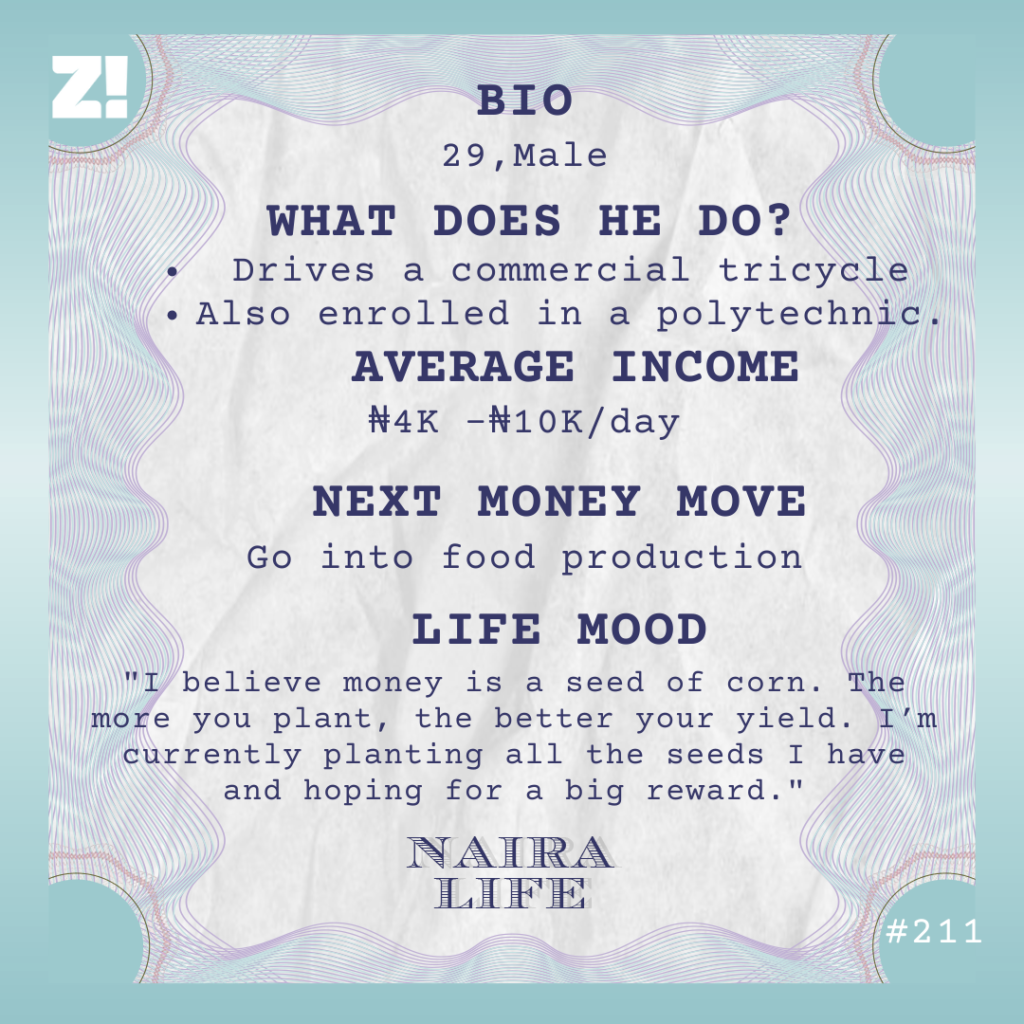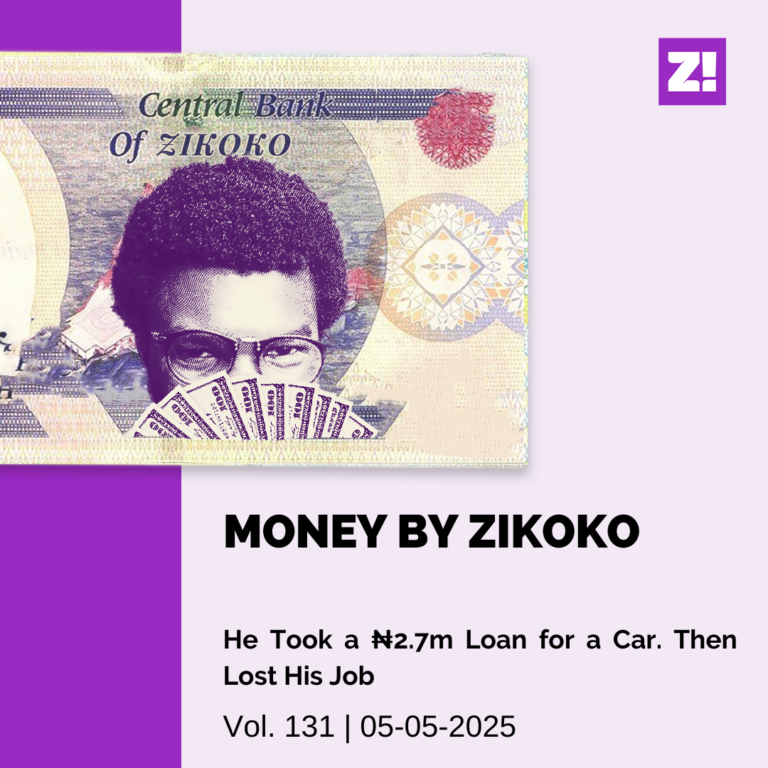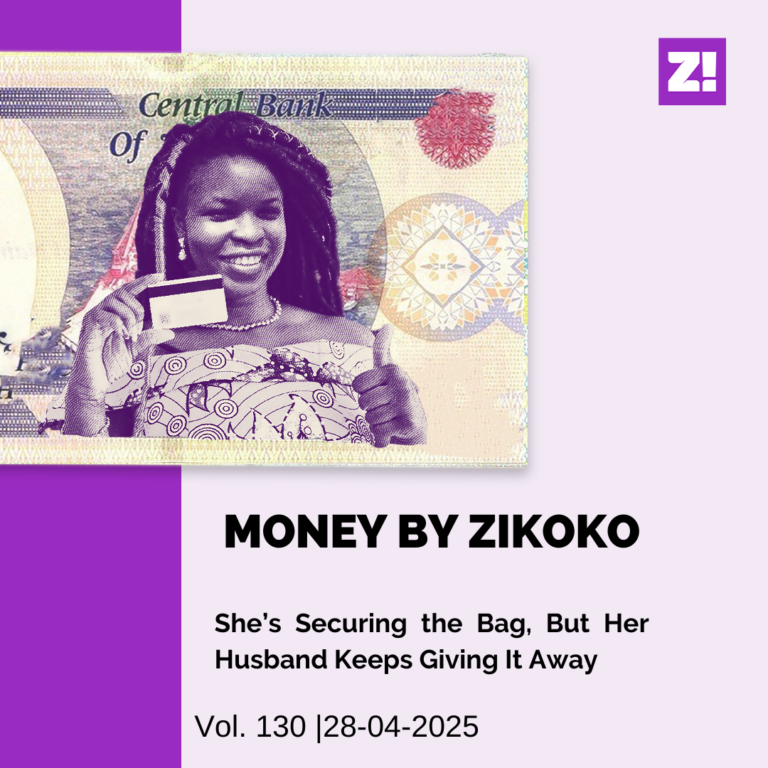Every week, Zikoko seeks to understand how people move the Naira in and out of their lives. Some stories will be struggle-ish, others will be bougie. All the time, it’ll be revealing.

Do you remember the first thing you did for money?
When I was 12, I started helping my mum at her foodstuff stall in Imo state. Because I spent a lot of time there, my mum bought me a manual grinding machine to make some money for myself. When people bought egusi or ogbono seeds from my mum, I’d grind them for them. I made ₦20 – ₦30 for every cup I ground and ₦200 and ₦300 per day.
What did you use the money for?
Taking care of small-small expenses in secondary school. My dad died when I was six, leaving my mum with eight kids. It’d be a challenge to raise us, so the family decided to give my mum time to take care of herself and figure things out. For the first three or four years after my dad passed, my siblings and I lived with relatives.
When she started her business in the market, I moved back home. By this time, I knew enough to know that money had value and could solve problems. The easiest problem I could solve for myself was a few things I needed in school.
This was my life for five years until I finished secondary school in 2012. I was 18 years old.
Did you know what you wanted to do next?
The plan was to continue my education, but money was a problem. I needed to find something else. My mum knew the principal of a school and helped me find a teaching job there. The pay was ₦10k, and I started work during the holiday, but I didn’t last a month there.
Ah! Why?
I had a short temper and was teaching the nursery 2 class. It was stressful dealing with the children, so I couldn’t sustain my interest in the job. One day, in the middle of an argument with my mum, I told her that I wasn’t going there anymore, and that was it. The school paid me my salary for the month, though.
But I quickly realised that it wasn’t easy to get a job, and I needed one to save to attend a higher institution. I apologised to my mum and asked if she could help me talk to the school to take me back.
How did your mum take this?
As well as I’d hoped. She talked to the school, but the position had been filled. Fortunately, there was another option – the school had a branch in Anambra state, and they needed a security guard. The pay was ₦11k plus free accommodation. I took it and moved to Onitsha. By the time I left a year after, my salary had increased to about ₦14k.
Your first structured salary
Yes. It was an eye-opener for me. It became clear that the actual value of my salary wasn’t as much as I thought it’d be.
I wasn’t extravagant, but almost all my salary went into feeding. I struggled to save ₦3k/month, and I wasn’t even consistent with it. If my salary was delayed for one day, I’d probably go to bed hungry that night.
Tough. Was this the reason you left the job?
It was. I needed to make more money. I left the job and the town and moved to Lagos. One of my brothers was in Lagos, and he told me some companies in the city paid better. He offered to let me stay with him and take care of my feeding while I found my feet.
In December 2013, I moved to Lagos. In 2014, I found work as a machine operator in a company that produced plastic products. My pay was ₦7k every two weeks.
So, ₦14k/month?
I was making extra money for meeting the production targets, which brought my salary to about ₦17k – ₦18k/ month.
I won’t lie, it was hard to meet these targets, but I took the job like it was my own. My production manager noticed this and put me in the quality control department.
Fascinating. How did this affect your pay?
It didn’t. The management didn’t sign off on it, so I didn’t get a raise. Nobody also told me why. What I knew was that I had more responsibilities in doing quality control for three different departments.
The more work and lesser pay finally got to me, and I left the factory.
Phew. We move
The good thing was that I built a savings structure while I was on the job. I was living with my brother and his wife and didn’t have to worry about feeding. My major expense was transportation, which was almost 50% of my salary. Other miscellaneous expenses took about 20%, and I saved 30%. Still not enough to go back to school.
What was your next job after you left the factory?
I worked at the loading bay of another factory that produced detergents. My experience was better here. The pay was about ₦108/hour, and the normal working hours were 8 am to 3 pm. But I also worked overtime until about 7 pm. At the end of most days, I made between ₦1200 – ₦1500. All of this put my salary between ₦33k and ₦35k/month.
I joined a contribution group, where I saved ₦10k per month. I was also sending some stipends to two of my siblings studying at the university.
Things were stable for a while. Sadly, my mum passed away in 2015, and her children — all eight of us had to chip in for her funeral. 90%of my savings went into this.
I’m sorry about your mum. How much did you have in savings?
About ₦100k. After we buried my mum, it was like I had to start all over again. But it was also time to try returning to school.
In 2016, I quit my job and moved to Delta state to stay with a relative. I had saved just enough to attend tutorials, write JAMB and apply to the university. I couldn’t combine preparing for the exams with my job in Lagos. Unfortunately, I wasn’t offered admission into the university I applied for, even though I did well in the exams.
Now, I needed another job. I called my old boss at the factory, and he offered me a space that had just opened up. When I moved back to Lagos, my job was still waiting for me.
Must have been a relief.
It was. Later that year, I moved out of my brother’s house in Lagos and started living with a friend. Our rent was ₦2k/month, which my friend took care of. On my part, I sorted some of the bills in the house.
How was it going at work?
In 2017, I was promoted to a supervisor at the warehouse, and my hourly pay increased to ₦115/hour, which ran into a little over ₦40k/month. When this happened, I increased my monthly savings to ₦15k – ₦20k.
But I also started feeling dissatisfied at work.
Did you know why?
I looked at people who had been in the factory for years, and there was a big difference between the life they could afford and the years they’d spent at the factory. I also noticed that the factory dropped workers when they felt like they no longer needed them. I just told myself that my future or the life I wanted to live wasn’t there.
When you pictured the life you wanted, what came to mind?
A life where I didn’t need to work long hours almost every day to make money. This is why I quit the job for good in 2018, returned home to the east, registered for JAMB, and applied to a university. I didn’t get the course I wanted, but they offered me another course. I decided to take it.
Sweet
I was hoping my older siblings who were already working would come in and sort out things like school fees. But the family called a meeting to tell me there was no money. I’d waited six years to return to school and supported my siblings who were in school during this time, so this was demoralizing.
However, one of my sisters called me aside and promised to make it happen the following year. In the meantime, she wanted me to follow her home to Abia state, where she lived with her husband, and find some work before it was time to write JAMB again.
I took her offer. But in my mind, I wasn’t going to build my plans around what anyone promised anymore.
Did you find another job?
Yes. I started working in a distillery as a forklift operator, where I earned ₦30k/month. I’m not sure how much I was saving this time, but I had more than ₦100k by the end of the year. Luckily, I did well in my admission exams and was admitted into a polytechnic. I used this money to sort out my acceptance fees, school fees, and house rent.
In 2019, I started classes in the department of food science at the Polytechnic. See, it felt like I had broken through a barrier.
I feel you. It’s impressive that you nursed this dream for seven years.
Thank you. That said, the issue was finding an income source to support me through school. The first opportunity was acting as a middleman between clothes wholesalers in the market and buyers in my school. I was making ₦500 – ₦1000 on each piece of clothing I sold, and I typically sold four clothes on most weeks.
Then Covid hit in 2020, and the school was closed. With nothing else to do, I tried going into the business of making popcorn, but the constant price increase of materials chased me away.
Oof.
Later that year, my brother-in-law helped me get a tricycle to use for commercial transportation. The deal with the owner was that I’d deliver ₦3k every day. Whatever remained was mine. During Covid, I made about ₦5k – ₦8k every day. But after Covid, my profit went up to ₦8k and ₦10/day, even though my daily delivery was also increased to ₦3.5k/day.
When I saw that I was making decent money from driving the tricycle, I decided to stick with it. After I finished my ND in 2021, I faced this hustle full-time. In May 2022, my brother-in-law came through again and helped me get a tricycle on a hire-purchase basis.
What was the payment plan like?
₦25k/week. It was supposed to run for 10 months, but I thought I could complete the payment faster if I worked hard. Between May 2022 and January 2023, any extra money I saw went into paying for the tricycle. I paid the full price in seven months.
Well done.
Another factor that played into this was that I’d applied for HND and wanted to finish paying for the tricycle before I returned to school. Thankfully, this happened and I’m back in school now. I gave the tricycle to someone, and they deliver ₦4k to me every day.
Do you plan on returning to this full-time after your HND?
Not really. The thing is, as much as I’ve been making decent money from this tricycle, I don’t want to make it for the rest of my life. It’s a stepping stone to the life I want, where I earn more.
What do you plan to do after your HND program?
Plan A is to become an entrepreneur and go into food production. I’m studying food science at the polytechnic, so this experience will be useful. I already have a recipe for a breakfast cereal I’m hoping to produce.
However, my capital and the availability of raw materials will determine if this is something I’ll do. I’m crossing my fingers.
How much is good money to you right now?
I don’t know because I don’t think about it. I’m in the investment phase of my life, and that’s why I returned to school. At the moment, the bulk of whatever I make goes into my education. I also recently started learning digital skills.
I believe money is a seed of corn. The more you plant, the better your yield. I’m currently planting all the seeds I have and hoping for a big reward.
Rooting for you. Where do you see all of this in five years?
If things work out the way I plan, I’ll be financially free. Essentially, this means that I’ve worked out a system that allows me to earn money without necessarily working every day. At the same time, I’ve put my money to work, and it’s making me more money. I’m not sure what these look like yet. But it’s my biggest dream.
I hope it comes true. Back to the present, what do your monthly expenses look like?

I’m not in school right now. I’m staying with a relative because of the elections. My expenses are a bit higher when I’m in school, but it’s also harder to track because I buy most of the things I need in bulk.
Is there anything you want but can’t afford?
A laptop or a saxophone will make me very happy right now. I make music on the side and released my first song in 2020. I’ll need about ₦150k to sort out both things.
What was the last thing you spent money on that made you happy?
This is also music-related. I paid for music production earlier this month, and it cost ₦50k. I’ve been writing songs for years but couldn’t produce them because I didn’t have the money. Now I can do this. It makes me happy because it gives me hope I can only do better from here on. It’s my biggest evidence of progress.
Wholesome. On a scale of 0-10, how would you rate your financial happiness?
7. I no longer feel incapacitated. There were times I looked away from things I needed because I couldn’t afford them. But now, I can comfortably afford the little, basic things I want. I would have extended this number to 10, but I don’t want to celebrate. Although I believe I’m on my way to where I can be and a future where my biggest dreams come true, I’m not there yet. 7 will have to do it for now.
If you’re interested in talking about your Naira Life story, this is a good place to start.
Find all the past Naira Life stories here.





